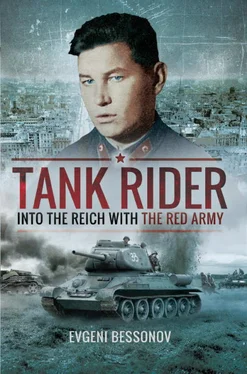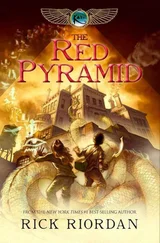The second assault was also unsuccessful. However, the Germans only spotted us when we got right under the entanglement. They tossed hand-grenades at us and opened machine-gun fire. A handgrenade went off next to me, but in the heat of the battle I did not pay attention to it. After that the Germans opened fire with mortars, even though they knew they might hit their own troops. Again we had to withdraw with losses. My garrison cap was torn and I found out that I was wounded in my head by grenade splinters. Sabaev bandaged my head.
In daytime, after an unimpressive artillery preparation and with the support of three T-34 tanks, we again assaulted the enemy’s trench and were again thrown back. The tanks were knocked out because of the failure of the crews: they had abandoned the tanks before they were knocked out and so the tanks kept on rolling empty towards the enemy. This really happened, I did not make it up and I never again saw such a shameful episode in the whole war.
During the night we assaulted twice more, and again it was in vain. To add trouble to our misery, a platoon of sixteen men led by a Lieutenant went missing in the 2nd company of the battalion during the night. They were looking for the platoon for several days, mostly at night, but never found them. Men just disappeared and no one knew where they went. These things also happen in war, war is always war.
I should say that the 2nd and 3rd battalions of the brigade also failed to advance during their attacks; their attacks were repelled with heavy losses in personnel. The enemy firmly held on to the dominant hill. The next day he sent his air force against us. From dawn till dusk, all day long, in wave after wave, German bombers dropped their bomb load on us. Soviet fighters were nowhere to be seen, so the German air force had every possible chance. Anti-aircraft guns tried to repel the air raid, but were also suppressed by the bombers. Besides bombing, the enemy opened artillery and mortar fire on us. We had the impression that the Germans were preparing for an attack, but it never came. Apparently, the enemy had been given the task of inflicting casualties on us to try and stop our attempts to capture the hill. And that is exactly what happened. That was my first experience of such a heavy air raid. It was pure hell; it is hard to find a comparison for it. You are just lying in your foxhole and waiting for death, bombs are exploding all around, the ground is shaking and you are shaking. I was frightened to death and wanted to run away from that hell, but I was a commander and had to stay with my soldiers. One has to know how to overcome fear. There are no fearless men, fear is natural, but some people are able to overcome it; others shiver but remember their responsibilities and get over it. The third type of people grows numb with fear and they literally lose their minds. Such people run anywhere just to hide, creating panic among others. These people are especially horrified by the enemy’s air force.
The twilight of that horrible day set in. The sun was setting and the enemy’s air force ceased its air raids; the artillery and mortar fire had stopped even earlier; it probably lasted just around one hour, or maybe even less. Time goes by slowly in such hell. One by one, the soldiers started to crawl out of their foxholes. Sabaev and I got out of the trench to check the soldiers in the platoon. I also spoke to the other platoon leaders and we counted our losses. To my surprise, the losses were lower than one might think considering the condition of our positions. Both mine and the other platoons in the company had insignificant losses. The 2nd and the 3rd companies of the battalion were the worst hit. The ground around our trenches was churned up with bomb craters, some foxholes collapsed and buried the soldiers that were in them, but they survived. My assistant platoon leader Sabaev had left a bag-pack and a helmet lying on the breastwork, which were hit with splinters – the helmet was pierced in several places. We were all thirsty, during the whole day we did not have a droplet of water. We were summoned to company commander Titov; his trench was some 150–200 metres from the front, on a ravine slope. We had some water at his place and asked to bring water to the front, to the soldiers. Titov cursed violently us for failing to complete the task and informed us that we were to retire from the sector and the brigade was transferred to another sector of the front.
We reported our losses from the air raid to Titov. I think we did not have anyone killed, but ten to twelve men were wounded and shell-shocked. Before dawn, still in darkness, the company quietly abandoned its positions. We marched for some 5 or 6 kilometres and stopped for a break in a ravine. A field kitchen drove up, we were fed and went to sleep. The day passed by. Battalion commander Kozienko summoned the officers in the evening and scolded us for not being able to capture the German trench and to overcome the barbed wire fence. However, he added: ‘There was no barbed wire entanglement. You just thought it up.’ The company commanders unanimously reported that there was an entanglement, but the battalion commander insisted on his version.
After our fruitless attempts to capture the hill we tried to launch attacks along different sectors of the front, but all those attempts failed and sometimes we pretended to launch the attack in order to distract the enemy’s reserves.
It was unbearably hot on those August days of 1943 in the Orel area, and we mostly moved on trucks during the night. There was a huge amount of dust on the roads, our feet sank into it as if it were cotton. By morning we were all covered with thick layer of dust. In an attempt to turn the area around Orel into a wilderness, the enemy burnt entire villages during his retreat, putting everything that he could to the torch. Just chimneys remained after the fire – a horrible, depressing view. Surviving civilians had to come back to those ashes. The Germans blew up railways and broke sleepers with a special machine, snapping them in two. Before their retreat the Germans, as a rule, would set village houses on fire. From the black pillars of smoke that rose from the burning houses we knew that the Germans were about to retreat and we could advance without resistance from their side, capturing the village as it burned. On 13 September, 1943, on the order of the front, the entire personnel of the Brigade, except for the officers, were transferred to other units to replace losses. Our company had just the sergeant–major, clerk, medic and company commander’s orderly, as well as my assistant platoon leader Sabaev. However, we continued to move along the front on trucks at night, sometimes with lights on, as late as 15 or 18 September. It was explained to us that this was done to deceive the enemy. During those days all units of the 4th Tank Army disengaged and went into reserve, concentrating in the thick forests around Bryansk in the vicinity of Karachev.

TRAINING FOR A NEW OFFENSIVE

After the end of the Orel operation the battalion had just 28 or 30 officers left, among them five company commanders, ten platoon leaders and thirteen staff officers – the remaining sixteen were either dead or wounded. The signal platoon leader – chief of communications of the battalion – was among the wounded staff officers. Only ten out of 22 platoon leaders were left. Just six of these ten lived to see Victory Day, and I was among those six. Just three company commanders survived the war. At that time we were all young: the platoon leaders were 20 or 21 years old. Company commanders were 26 to 27 years old, the battalion commander was 29. Most of the officers were young men in their twenties.
Читать дальше














